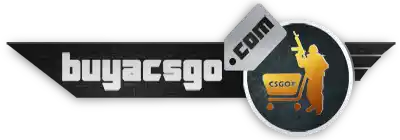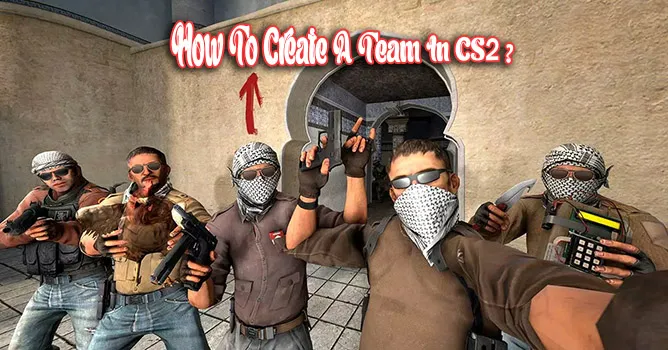CS:GO Category
Full Guide To Create A Team In CS2 By BuyaCSGO
Counter-Strike is a game that heavily relies on skill, making it necessary for new players to improve gradually. With each step they take, they acquire new knowledge and abilities. However, there comes a point where progress plateaus.
When playing in matchmaking, players are restricted to teaming up with random individuals to face a similarly randomized opposing team. Upon witnessing professional matches, one may desire a similar experience, where they can confront opponents with a dependable team supporting them. This marks the start of an exciting journey.
In this article, we will explore how to initiate the process of creating a team in CS2, taking that crucial first step.
Step-by-Step Process to Create a Team in CS2
Creating a team in Counter-Strike: Global Offensive (CSGO) requires careful planning and coordination. This step-by-step guide will explain each stage in detail, helping you create a successful team.
-
Create a Steam-Group
It is essential to start with the basics, such as creating a Steam Group. You should already have an idea of what name you want to give your team. For this example, let’s call it “Pro Clan.” Additionally, you must choose an abbreviation for the team’s name, which will be displayed in the game. A suitable abbreviation for “Pro Clan” is “||Pr0||”. Setting the group as private is also advisable to prevent random individuals from joining. These initial tasks are straightforward and crucial.
Moreover, it is important to consider the significance of CSGO accounts in the process. When assembling your team, acquiring CSGO prime accounts for your players is beneficial. CSGO prime accounts offer several advantages, including access to prime matchmaking, which generally provides a better gaming experience with more skilled and dedicated players.
Equipping your team members with prime accounts can elevate their overall gaming experience and heighten the competitiveness of your matches. Furthermore, it helps mitigate the risk of encountering hackers or cheaters since prime matchmaking has a lower likelihood of encountering such players. Hence, when forming your CSGO team, you should consider obtaining Prime for your players to ensure a more rewarding and equitable gaming environment. Now, let’s proceed to the next step.
-
Set Criteria for Team Members
Here are some factors to consider when searching for team members. Additionally, think about any other criteria that may be important for your specific team:
- Language: Clearly state the language used during meetings and matches.Headset with Microphone: Effective communication is vital for team play, so a high-quality headset with a microphone is essential. Using separate microphones may not be ideal as they tend to capture background noise.
- Time Zone and Ping: Different time zones may require meetings at inconvenient hours, and high latency can affect effective gameplay.
- Player Age: While it may seem insignificant if most team members are adults and a new player is under 18, there might be inappropriate jokes or banter. If you are over 18, your team members should be as well.
- Role Preferences: Inquire about role preferences in the game to avoid conflicts. If everyone wants to be a sniper, it can lead to issues.
- Experience: Having team members at similar skill levels is beneficial to avoid frustration among veterans and discouragement among less experienced players. Consider playing a few practice matches together to assess compatibility. Alternatively, player ranks can serve as a basis for determining experience levels. Experienced players are often more dedicated and willing to adhere to the team’s schedule and rules.
- Availability and Reliability: Ensure team members have the time to commit to playing. Determine preferred practice meeting times (e.g., every Friday evening, every Monday at 8 p.m., a few days a week). If someone is unavailable during those times, consider finding a different team member. Later, create a shared document where people can list their availability for upcoming weeks. A replacement may be necessary if a player consistently misses meetings without a valid reason. The team should not suffer because of one person and plenty of reliable individuals are available.
- Willingness to Improve: Assess if potential candidates desire to learn and are open to constructive feedback and criticism. Evaluating player performance and providing feedback is crucial for improvement. If someone is overly sensitive to criticism, they may not be the best fit for your team.
- Motivation: Being part of a team requires dedicating real-life time to gaming. Ensure that potential candidates understand this commitment and are willing to invest time each week for practice with the team.
- Be Respectful: Fostering a positive atmosphere will boost motivation and lead to valuable friendships beyond the virtual realm. Provide feedback politely and respectfully.
-
Find Like-Minded Players to Create a Team in CS2
To find like-minded players, you can use various platforms and resources. These include online forums, CSGO communities, social media, and even in-game matchmaking. Advertise your team and specify the criteria you established in the previous step to attract potential teammates.
-
Establish Roles to Create a Team
Once you have a pool of interested players, it’s crucial to establish roles within the team. Roles in CSGO typically include entry fragger, support player, AWPer, lurker, and in-game leader. Assign roles based on players’ strengths, preferences, and the team’s overall strategy.
- Sniper: In the present day, it is common for a team to have a designated AWP player. Having two players using sniper rifles is not advisable, especially when playing on the attacking side. However, employing two snipers in defence can be somewhat effective for holding multiple plant locations simultaneously. The sniper is the player entrusted with handling the AWP without hesitation. This individual should also possess proficiency with pistols and other rifles.
- Entry fragger: Next, you will require a player who assumes the role of a “hunter” on your team. This individual fearlessly seeks opportunities to secure the first kill on the map, providing their team with a crucial advantage. They must excel with all types of weapons and understand the map’s high-traffic areas and common enemy positions. This knowledge enables them to effectively weaken the enemy’s defence or facilitate the team’s advancement.
- Captain: The captain’s role is not primarily focused on combat potential, so we did not mention it first. During a match, the captain plays a pivotal role by shouldering full responsibility for decision-making and organizing the team to be in the right place at the right time. They serve as the “head” of the team and must prioritize strategic thinking over shooting skills. Typically, the captain does not have the team’s highest kill-to-death ratio (KDA). Leading a team and maintaining focus is more challenging than it may appear at first glance.
- Anchor/Lurker, Clutcher, Support: These two players carry significant responsibilities and have specific tasks throughout the map. As attackers, they can manoeuvre behind enemy lines, while as defenders, they serve as the first line of defence against enemy advances on the plant sites.
Note:
If you decide to form your team in CSGO, there are essential requirements for all players. Every team member must possess good decision-making abilities, a sense of timing, the ability to provide information, and the capability to assist teammates in challenging situations. Everyone should also possess sharp shooting skills, as it is a fundamental requirement in games like CSGO.
-
Practice Regularly
You and your team can engage in numerous activities, both within and outside the game, to enhance your performance as a cohesive unit. Here are some ideas:
-
- Begin by playing a few matches to familiarise yourself with each other’s playstyles and performance.
- Analyze your gameplay demos as a team, encouraging everyone to share their observations and ideas.
- Master the intricacies of individual maps, identifying optimal positions for defence, ambushes, and other strategic manoeuvres.
- Watch professional team demos and recommend valuable learning resources such as YouTube videos, websites, and Reddit threads.
- Watch tournaments and championships as a team, exchanging noteworthy recordings and insights.
- Develop your strategies and adopt effective tactics professional teams use, practising and refining them in-game.
- Learn the callouts specific to each map and establish clear keywords or signals for effective communication.
- Keep each other motivated and maintain a positive team spirit, supporting and encouraging one another.
- Seek opportunities to practice and exchange feedback with other teams after matches.
- Participate in your first tournaments to gain experience and exposure in a competitive setting.
Remember, by actively engaging in these activities, you and your team can improve your skills, coordination, and overall performance.
-
Develop Communication
During any training session, it is crucial to closely monitor how players communicate on platforms like Discord or any other voice chat. Avoid excessive “spamming” in the voice chat during the game. The importance of in-game sounds in CSGO cannot be overstated.
If your teammate’s jokes or unrelated conversations hinder your ability to hear important cues like enemy reloads or grenade preparations, it can harm the match’s outcome. Discipline is vital for your team’s success.
The concept is simple: have concise discussions about the plan between rounds and provide clear and concise information about the enemy or any issues relevant to your position during the rounds.
There should never be any arguments or insults. Train yourself to provide useful information, such as the enemy’s exact position, rather than vague descriptions like “he’s low on health.” This enables your teammates to react swiftly and make effective trades.
You must develop various training exercises once you have established effective team communication. Merely casually playing on deathmatch servers will not be sufficient to create a competitive team capable of winning tournaments.
Above all, dedicate time to learning grenade setups, creating grenade binds, and devising multiple tactics for each map. Relying solely on basic strategies like “smokes on A” in Mirage will not guarantee success against skilled opponents.
Also, utilize different tactics like “splits” (dividing players on the map to approach a point from different directions), execute quick attacks (rapidly assaulting a point), and devise several “fake rounds” to deceive your opponents.
The more deceptive rounds you have, the harder it will be for your opponents to predict your moves during the match.
-
Continuously Learn and Adapt
CSGO is a dynamic game, and the meta evolves. Stay updated with game updates, patch notes, and professional play.
Continuously learn new strategies, adapt to changes, and experiment with different playstyles. Be open to feedback and encourage individual and team growth.
Conclusion
To create a team in CSGO, you require careful planning, dedication, and effective communication. By following these steps, you can establish a solid foundation for your team’s success.
Consequently, remember to remain patient, adapt to challenges, and continuously strive for improvement. Good luck!

